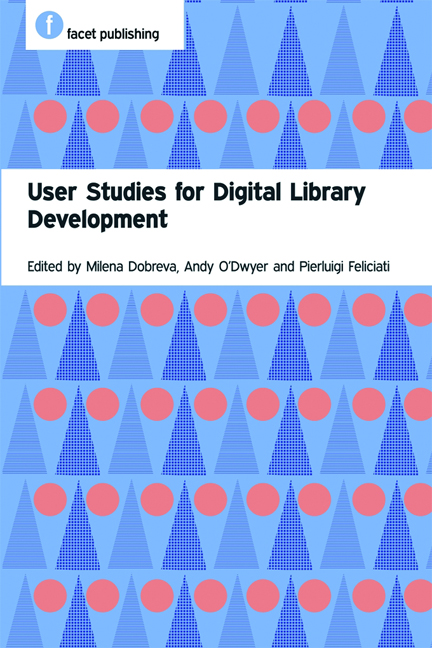Book contents
- Frontmatter
- Contents
- Preface
- Acknowledgements
- Abbreviations
- Glossary
- 1 Introduction: user studies for digital library development
- PART 1 SETTING THE SCENE
- PART 2 METHODS EXPLAINED AND ILLUSTRATED
- PART 3 USER STUDIES IN THE DIGITAL LIBRARY UNIVERSE: WHAT ELSE NEEDS TO BE CONSIDERED?
- PART 4 USER STUDIES ACROSS THE CULTURAL HERITAGE SECTOR
- 18 User studies in libraries
- 19 User studies in archives
- 20 User studies in museums: holding the museum in the palm of your hand
- 21 Digital art online: perspectives on user needs, access, documentation and retrieval
- 22 User studies for digital libraries’ development: audiovisual collections
- 23 A business-model perspective on end-users and open metadata
- PART 5 PUTTING IT ALL TOGETHER
- Index
21 - Digital art online: perspectives on user needs, access, documentation and retrieval
from PART 4 - USER STUDIES ACROSS THE CULTURAL HERITAGE SECTOR
Published online by Cambridge University Press: 08 June 2018
- Frontmatter
- Contents
- Preface
- Acknowledgements
- Abbreviations
- Glossary
- 1 Introduction: user studies for digital library development
- PART 1 SETTING THE SCENE
- PART 2 METHODS EXPLAINED AND ILLUSTRATED
- PART 3 USER STUDIES IN THE DIGITAL LIBRARY UNIVERSE: WHAT ELSE NEEDS TO BE CONSIDERED?
- PART 4 USER STUDIES ACROSS THE CULTURAL HERITAGE SECTOR
- 18 User studies in libraries
- 19 User studies in archives
- 20 User studies in museums: holding the museum in the palm of your hand
- 21 Digital art online: perspectives on user needs, access, documentation and retrieval
- 22 User studies for digital libraries’ development: audiovisual collections
- 23 A business-model perspective on end-users and open metadata
- PART 5 PUTTING IT ALL TOGETHER
- Index
Summary
Introduction
Digital art is a manifestation of modern cultural creativity and needs to be represented in the cultural heritage record of our contemporary world. However, current practices within the digital art community reflect a dysfunction between this understanding at a theoretical level and the ad hoc manner in which digital art is collected, described and distributed in online repositories (Konstantelos, 2009). This chapter explores the potential value of digital artwork stored in multiple online sources from a scholarly and educational point of view. In doing so, the chapter presents findings from a threeyear research project in the Humanities Advanced Technology and Information Institute (HATII) at the University of Glasgow that investigated the explicit needs of particular communities for digital art discovery, retrieval and documentation from an educational and research perspective. The initial hypothesis postulated that these issues can be addressed by adopting content aggregation, which is manifested in the form of a digital library (DL) collection. A useroriented approach was employed and data was collected from the target populations of arts and humanities scholars, digital artists and members of the DL community, using a social survey methodology.
Motivation and background
The motivation for this study stemmed from the significance of digital art's inclusion in structured electronic repositories as a creditable asset within the range of informational and cultural material. Waters suggests that
few institutions have begun to assemble primary source collections of […] digital art and other uniquely digital artefacts that help serve as a record of modern culture for future scholars.
Waters (2006)Similarly, Hedstrom et al. (2003) discuss the requirement for continuing access to digital content, which will allow future generations to understand the changes in society that have been introduced by the evolution of the internet and the emergence of such manifestations as digital art. This is only possible if such material is collected and maintained in a systematic manner and accessed through effective tools, for the benefit of current and future users.
- Type
- Chapter
- Information
- User Studies for Digital Library Development , pp. 217 - 224Publisher: FacetPrint publication year: 2012



